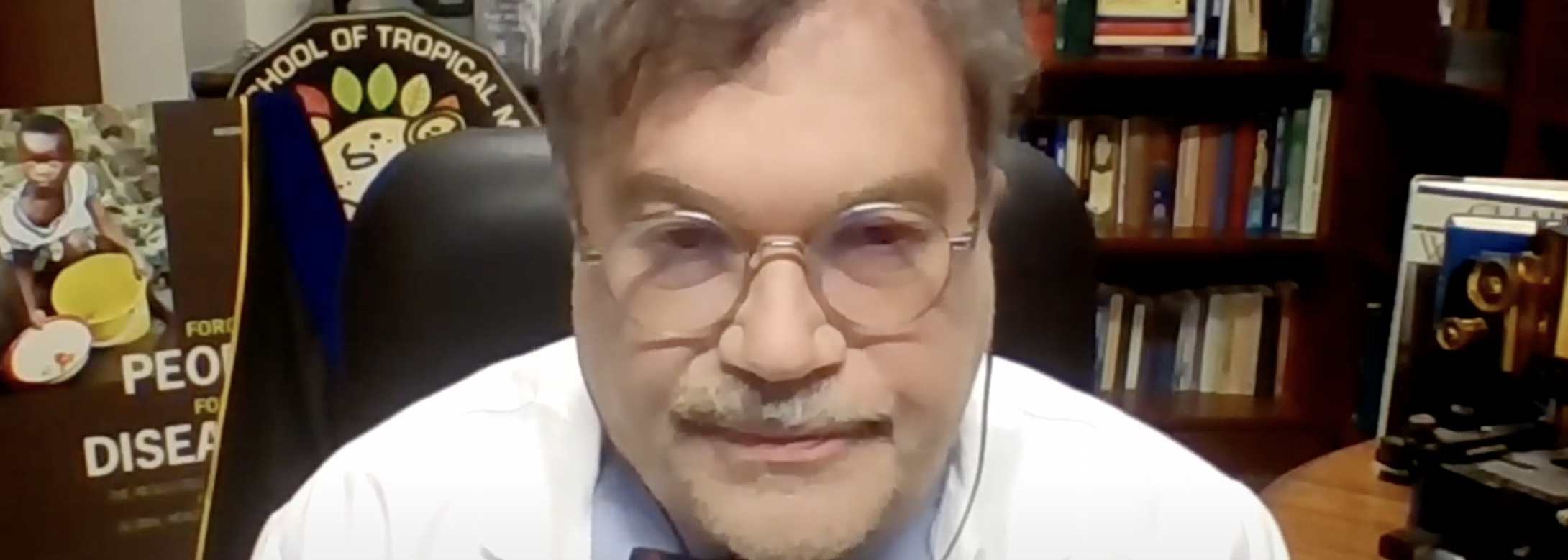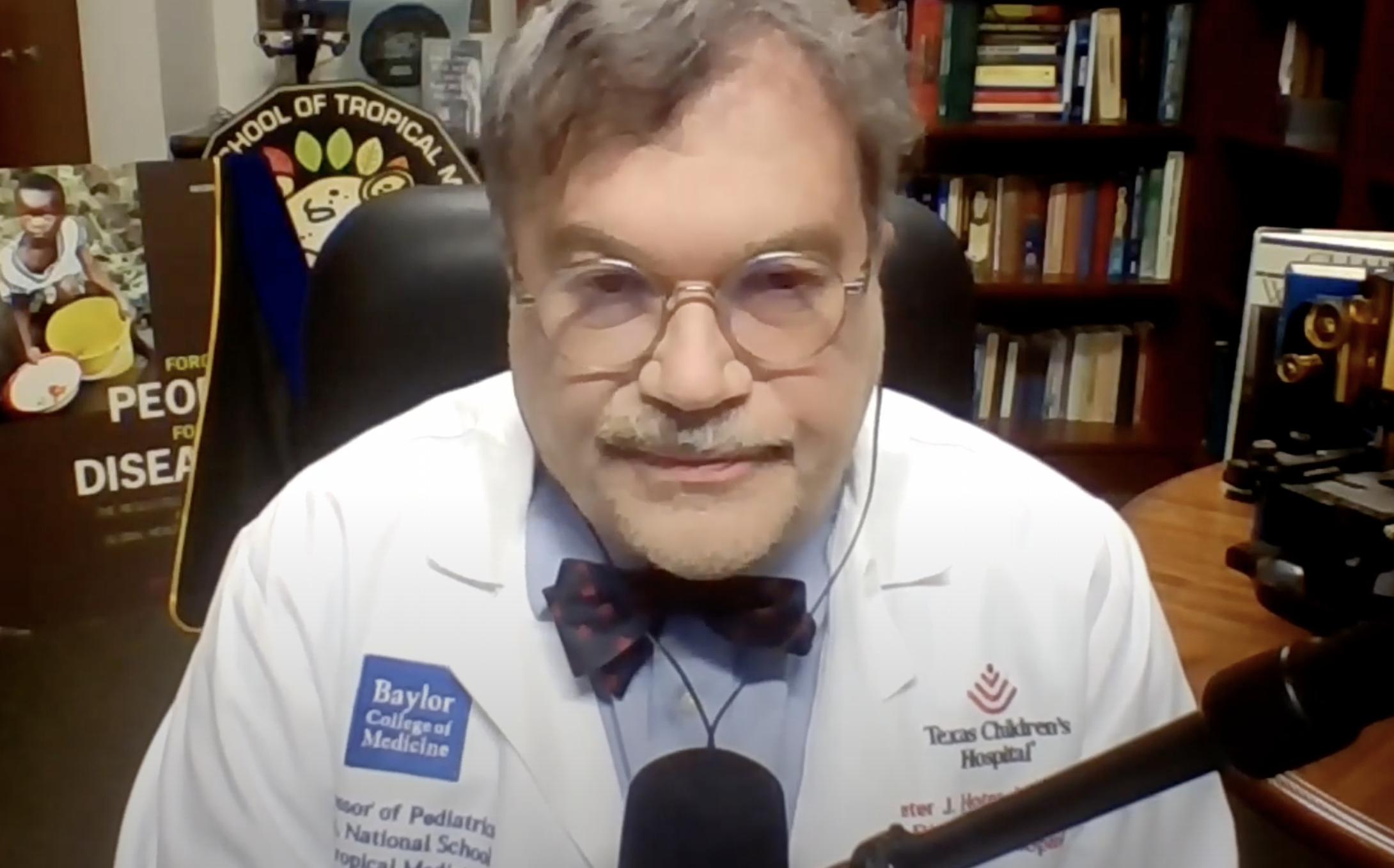Published: 11/05/2021
By Tasnim Ahmed, Global Health Media Fellow, Stanford Center for Innovation in Global Health
STANFORD, Nov 3 – A misguided focus on speed and innovation over scalability by developed nations led to inequitable COVID-19 vaccine distribution worldwide, contended Internationally recognized Vaccine and Tropical Disease Expert Peter Hotez, MD, PhD, during a Global Health Conversation with Stanford’s Paul Costello.
Hotez joined the Center for Innovation in Global Health (CIGH) on Wednesday, Nov. 3 to discuss misinformation about the COVID-19 vaccine and methods to increase global vaccine equity.
Hotez and Dr. Maria Elena Bottazzi, co-directors of the Texas Children’s Center for Vaccine Development, led the development of a COVID vaccine known as “Corbevax.”
Unlike the popular Pfizer and Moderna mRNA vaccines, Corbevax relies on an age-old method to make its vaccines, allowing it to be more cost-effective and accessible. Dr. Hotez sees Corbevax as the solution to the COVID vaccine demand in low-income countries.
– Dr. Peter Hotez
“You can’t go from zero to nine billion [vaccines] with a new technology right away. Everyone was so focused on speed and innovation.”
“You can’t go from zero to nine billion [vaccines] with a new technology right away. Everyone was so focused on speed and innovation,” Hotez told the Zoom audience. He is referring to his estimate that three billion people in the world have yet to receive an mRNA vaccine and would require at least three doses given the need for booster shots. Dr. Hotez says that the global south will suffer the most for poor planning on the part of governments and big pharmaceutical companies.
Hotez has struggled to receive funding for the research of Corbevax, and he believes it is because government organizations were more intrigued by the speed and innovation of mRNA vaccines, which were employed for the first time during this pandemic.
Instead, big pharmaceutical companies such as Pfizer received millions of dollars from the German and American government to produce their vaccines. Hotez discussed relying on private philanthropy to fund his project, for which he successfully raised $6.9 million.
“Had we had the level of support or half the level of support that the pharma companies have, then we would have the world vaccinated by now,” he said.
The Texas Children’s Center for Vaccine Development is now partnering with Biological E in India and Biopharam in Indonesia to mass produce the Corbevax in those countries.
Hotez has also been an outspoken critic of vaccine misinformation, long before the pandemic. He wrote Vaccines Did Not Cause Rachel’s Autism, a book based on his daughter, to dispel myths about the relationships between vaccines and autism. He has written opinion pieces for Fox News and has been featured on CNN and C-SPAN discussing the importance and safety of available COVID-19 vaccines.
His public condemnation of the anti-vax movement has been met with dissidence, even from some federal agencies that said he was bringing unwanted attention to the movement. Hotez, who is Jewish, has received anti-Semitic sentiment from some critics, but he continues to stand by his advocacy. He believes that most of the lives lost to the Delta Variant were due to what he calls “anti-science aggression,” or a mistrust of vaccines.
Dr. Hotez is no stranger to advocating for overlooked issues in medicine. He has spent most of his career studying vaccines for neglected tropical diseases such as hookworm and schistosomiasis, diseases that primarily affect populations in underdeveloped countries.
“Science has the ability to repair the world.”
– Dr. Peter Hotez
“Science has the ability to repair the world,” Hotez told the audience. It’s his guiding mantra, and one he believes that political leaders should adopt.
Dr. Hotez’s recently published book, Preventing the Next Pandemic: Vaccine Diplomacy in the Time of Anti-science, explores the role political relationships play in pandemics and the spread of scientific misinformation. Looking to the future of the pandemic, he believes that the Biden administration must commit to donating a vaccine dose to a country in need for each dose that it purchases for Americans.

